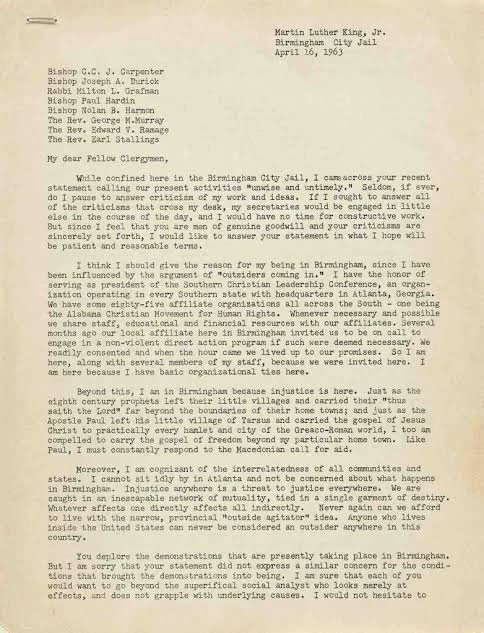As Episcopalians waste time on their usual transactional or financial “solutions” to racism (think Sacred Circles, book study groups, reparations), many use these activities as an excuse to avoid actually dealing with racism, prejudice, bullying, and other misconduct. That’s true both within the church, and in larger society.
This tendency to seek “moderate” approaches is neatly parsed by the Rev. Martin Luther King, Jr., (MLK) in his letter from the Birmingham jail. Two of the recipients were — you guessed it — Episcopal bishops who urged MLK to go slow, avoid sit-ins and other non-violent protests, and other open confrontation.
In his ardent letter, MLK makes clear that the biggest problem he saw in ending racism was not the KKK and the massive resistance of the South to integration, but rather white moderates.
That begs the question: Are you a white moderate? Would you consider non-violent protest? To you honestly believe that your sacred circle will end racism? How would you react if someone picketed your church on the basis that it is not integrated? (Blacks make up 13.6 percent of the U.S. population, but just 6.3 percent of the church’s membership. So yes, your church likely is segregated.)
And we can take the argument one step further. Within your parish, do you prefer peace and quiet over social justice? Do you respond as Jesus would in the face of injustice and oppression within the church? How do you respond to bullying, exclusion or persons marginalized within your parish? And yes, every parish has these issues.
What would MLK say if he visited your church? Would he say that, as moderates, your parish is part of the problem? Would he say you are part of the problem?
And what would Jesus do? Something tells me he wouldn’t have a book discussion group.
It will soon be 60 years since MLK wrote his letter. But far too many don’t even know what the letter says, or its role in history.


Leave a Reply